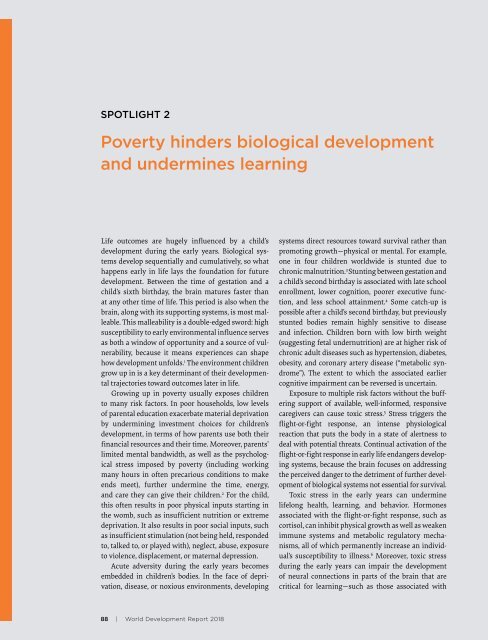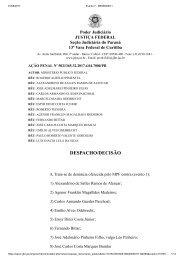Brasil só deve dominar Leitura em 260 anos, aponta estudo do Banco Mundial Relatorio Banco Mundial _Learning
You also want an ePaper? Increase the reach of your titles
YUMPU automatically turns print PDFs into web optimized ePapers that Google loves.
SPOTLIGHT2<br />
Povertyhindersbiological<strong>deve</strong>lopment<br />
andundermineslearning<br />
Life outcomes are hugely influenced by a child’s<br />
<strong>deve</strong>lopment during the early years. Biological syst<strong>em</strong>s<br />
<strong>deve</strong>lop sequentially and cumulatively, so what<br />
happens early in life lays the foundation for future<br />
<strong>deve</strong>lopment. Between the time of gestation and a<br />
child’s sixth birthday, the brain matures faster than<br />
at any other time of life. This period is also when the<br />
brain, along with its supporting syst<strong>em</strong>s, is most malleable.<br />
This malleability is a <strong>do</strong>uble-edged sword: high<br />
susceptibility to early environmental influence serves<br />
as both a win<strong>do</strong>w of opportunity and a source of vulnerability,<br />
because it means experiences can shape<br />
how <strong>deve</strong>lopment unfolds. 1 The environment children<br />
grow up in is a key determinant of their <strong>deve</strong>lopmental<br />
trajectories toward outcomes later in life.<br />
Growing up in poverty usually exposes children<br />
to many risk factors. In poor households, low levels<br />
of parental education exacerbate material deprivation<br />
by undermining investment choices for children’s<br />
<strong>deve</strong>lopment, in terms of how parents use both their<br />
financial resources and their time. Moreover, parents’<br />
limited mental bandwidth, as well as the psychological<br />
stress imposed by poverty (including working<br />
many hours in often precarious conditions to make<br />
ends meet), further undermine the time, energy,<br />
and care they can give their children. 2 For the child,<br />
this often results in poor physical inputs starting in<br />
the womb, such as insufficient nutrition or extr<strong>em</strong>e<br />
deprivation. It also results in poor social inputs, such<br />
as insufficient stimulation (not being held, responded<br />
to, talked to, or played with), neglect, abuse, exposure<br />
to violence, displac<strong>em</strong>ent, or maternal depression.<br />
Acute adversity during the early years becomes<br />
<strong>em</strong>bedded in children’s bodies. In the face of deprivation,<br />
disease, or noxious environments, <strong>deve</strong>loping<br />
syst<strong>em</strong>s direct resources toward survival rather than<br />
promoting growth—physical or mental. For example,<br />
one in four children worldwide is stunted due to<br />
chronic malnutrition. 3 Stunting between gestation and<br />
a child’s second birthday is associated with late school<br />
enrollment, lower cognition, poorer executive function,<br />
and less school attainment. 4 Some catch-up is<br />
possible after a child’s second birthday, but previously<br />
stunted bodies r<strong>em</strong>ain highly sensitive to disease<br />
and infection. Children born with low birth weight<br />
(suggesting fetal undernutrition) are at higher risk of<br />
chronic adult diseases such as hypertension, diabetes,<br />
obesity, and coronary artery disease (“metabolic syndrome”).<br />
The extent to which the associated earlier<br />
cognitive impairment can be reversed is uncertain.<br />
Exposure to multiple risk factors without the buffering<br />
support of available, well-informed, responsive<br />
caregivers can cause toxic stress. 5 Stress triggers the<br />
flight-or-fight response, an intense physiological<br />
reaction that puts the body in a state of alertness to<br />
deal with potential threats. Continual activation of the<br />
flight-or-fight response in early life endangers <strong>deve</strong>loping<br />
syst<strong>em</strong>s, because the brain focuses on addressing<br />
the perceived danger to the detriment of further <strong>deve</strong>lopment<br />
of biological syst<strong>em</strong>s not essential for survival.<br />
Toxic stress in the early years can undermine<br />
lifelong health, learning, and behavior. Hormones<br />
associated with the flight-or-fight response, such as<br />
cortisol, can inhibit physical growth as well as weaken<br />
immune syst<strong>em</strong>s and metabolic regulatory mechanisms,<br />
all of which permanently increase an individual’s<br />
susceptibility to illness. 6 Moreover, toxic stress<br />
during the early years can impair the <strong>deve</strong>lopment<br />
of neural connections in parts of the brain that are<br />
critical for learning—such as those associated with<br />
88 | World Development Report 2018








